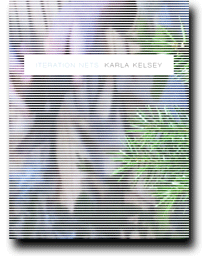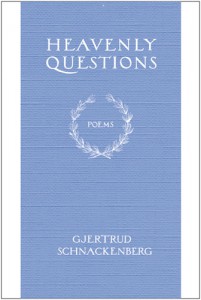 Iteration Nets
Iteration Nets
Karla Kelsey
Ahsahta Press, 2010
In the second movement of her sophomore collection, Iteration Nets, Karla Kelsey details the process of echo and alteration by which she remixes lines from authors including John Clare, Graham Greene, and Lyn Hejinian:
what was said? Parison? Comparison uttered after a silence dampening off the corn? Pair a son. Pear in sun. Pare the sun so that the roses glow forth. Bad this son. Pad a song. Sad too long in higher red asking to thank, to atone, to bask the centuries away.
This associative stammer pops delightfully, like letters in a Boggle board, as it hotwires a misheard phrase. But Kelsey’s sonic playfulness is hardly free play. She anchors meaning as each iteration shoots forth, not refreshing the slate but adding to it: the pared sun circles back to bask us; the roses’ red returns after sadness. Because language lives in time, Kelsey’s playfulness thanks and atones for each move it makes, whatever freewheeling half-prattle forged it. Although our speech may be fragmented, such “speaking / flames // splinter // over darkness.”
Iteration Nets is conceptually complex. The second movement flushes the book’s initial sonnets into meditative prose; the third chips the prose’s grand domes into evocative shards, recalling the poems of Gustaf Sobin and Ronald Johnson’s erasure of Paradise Lost. In mining these constraints, Kelsey continually arrives at poetry that is not only conceptual but gorgeously consequential. Even readers skeptical of anything influenced by Stein will find stunning lines and riveting music in the book’s most abstract passages. These lines can be both hotly effusive (“I loved him like the little bird shot through with here we have pastured. I loved him like the little bird on this western plane folding into mountains where wild horses tie land and a cry perforates thin air”) and classically honed (“the snow / blooming // redbud”). Such moments advance the collection’s sensuous inquiry into perception and transformation.
The book’s re-iterating method is inspired by Louis Zukofsky’s homophonic versions of Catullus, which feel most poignant for their hairpin avoidance of nonsense. Similarly, Kelsey’s poems thrill because their free-falls land in unexpected nets, the “branch that snaps promising a diffusion of light” becoming “metaphor, birds arcing triangular through sky, light thickened then fled in a slant shower.” Because she takes the falling seriously, the nets that accommodate it are equally harrowing.
Particularly in the sonnets’ “bare sad hymns” of “brittle down,” the aural richness puts a fresh catch in one’s step. As in the sonnets of Berrigan and Donne, this tripping pitches the reader forward into “Day new rose,” which “Spans full. Blissed hull.” When the second movement’s “long beautiful sentences” enter to “hum in my brain,” the conceptual effect is as bodily as moving through the rooms of a Roman bath, “flying through tall buildings” where “the day went and I gleamed open.” Iteration Nets is a virtuosic collection, steeped with “life / pulsed through / sun” and lush faith in “the view / tethered to / the mind.”
—
 Heavenly Questions
Heavenly Questions
Gjertrud Schnackenberg
FSG, 2010.
The formal virtuosity in Heavenly Questions, Gjertrud Schnackenberg’s most recent collection, is devastating. Through six linked meditations in insistently regular blank verse (in the first poem, the eleventh syllable winking at the end of “Whose heaven rotates taking its own measure” feels jarring), Schnackenberg examines the “mortal body, spectral to the core” of her dying husband. The grief that follows “the fifth surgery / Of five” shows this elegant and capaciously intelligent poet—in the same phrase, Schnackenberg can treat mathematical and theological infinity—moved to simple plea: “No questions anymore. Just say he’ll live.”
Among Schnackenberg’s singular range (“Intangible, the fabric tourniquets / The seraphs tie and tie with anxious hands— / But when they turn, to see it for themselves, / Atoms unbind, down to their nuclei”), this plainness is heartbreaking. Yet Heavenly Questions is not a portrait of a poet reduced. Instead, the depth of its lament elevates art’s “self-organizing equilibrium,” as though by making “myriads appear, self-multiply, / And multiply again” verse can play Scheherezade, letting dying happen “in slow motion, slower still, / And slower still.” Like a lullaby that savors the wakefulness it dispels, Heavenly Questions rests near the cusp of death, at the “still-unbroken substratum of wonder,” honoring how the dying lived “open-handed, unafraid.”
To make more time exist, Schnackenberg finds forms that change the clock, relishing paradox, riddle (“What can’t be stood outside of, looking on? / What is the all in all in all in All?“), and conversational sancta (“He thanked me even then”). She lingers on surfaces, depicting an imagined banner with “a woodcut surgeon opening a book / Of workshop woodcuts, skilled, anonymous” and a frontispiece that shows “Renaissance physicians, crowding near.” And she details the marvels and myths at the roots of science, as though she can find alternate medicine in “forgotten thought-machines, / And wonder-works, dismantled on the sand: // A ship, reduced to ashes by a mirror; / A planetarium of hammered bronze.”
Following Schnackenberg’s bluntest presentation of her husband’s death (“I swayed, dead on my feet, among the living, / Then stood away. Still his wife. / But couldn’t draw one breath on his behalf. / Nor add a single heartbeat to his life.”), the final poem adapts a bedtime story about the origins of chess from the Mahabharata. Through the tale, through chess’ absorptive spell, Schnackenberg charms more time from an evening’s hour, although “all that could be done had now been done.”
Earlier in the collection, Schnackenberg describes Archimedes subdividing earth so it can “materialize, and dematerialize” into numberless grains, as well as a legend that Hagia Sophia “lay under a spell such that no one / could count” all of its doors (“Another door was always added: one”). Heavenly Questions’ final poem adds one night, one more speech after the “apparition of the body scan.” When the poem fails to stop time, as even verse so supersaturated with curiosity and care must, there is not lament but silence. It breaks off, as “here the god of writers broke his pen.”
—
 Zach Savich is the author of three collections of poetry, including The Firestorm (Cleveland State University Poetry Center, 2011), and a book of ardent prose, Events Film Cannot Withstand (Rescue+Press, 2011). He serves as Book Review Editor with the Kenyon Review. His writing has recently appeared in journals including Gulf Coast, A Public Space, and Oh No.
Zach Savich is the author of three collections of poetry, including The Firestorm (Cleveland State University Poetry Center, 2011), and a book of ardent prose, Events Film Cannot Withstand (Rescue+Press, 2011). He serves as Book Review Editor with the Kenyon Review. His writing has recently appeared in journals including Gulf Coast, A Public Space, and Oh No.
